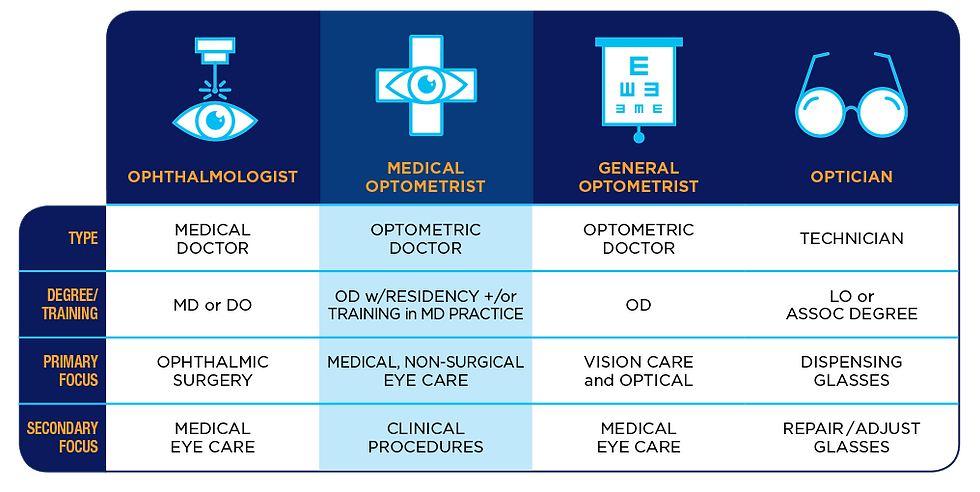The Role of a Medical Optometrist: Explained by Dr. Kayla Bechthold
- Kayla Bechthold OD
- Mar 2
- 2 min read
Many people question whether they have an eye problem or if it's time for an eye exam, what type of eye care provider do I need to see?
There are a team of providers that help with each aspect of eye care. This info graphic gives a nice breakdown of services provided by each.

Info graphic courtesy of Medical Optometry America
An optician is trained in measuring and adjusting glasses. Opticians make sure the optics are accurate. This is the best option to get a good fit and to maximize the effectiveness of a new glasses prescription. Ordering glasses online will never replace the care and expertise of a trained optician.
For yearly routine exams, glasses or contact lens updates, an in person exam with a general optometrist is a good choice. This assures that if you have any eye conditions with little or no symptoms (like glaucoma) they will be caught in a timely fashion. Online eye screenings do not replace an eye exam with a general optometrist.
If you are having changes in vision or concerns about your eye health, a medical optometrist is a wise choice. You will undergo the standard tests of general optometry, along with additional expertise from a provider who has completed a medical residency in optometry or has worked exclusively in an ophthalmology setting for at least five years. Typically, a medical optometrist has a concentration in treating eye disease, such as macular degeneration, glaucoma, diabetic eye health and dry eye, among others. Many are fellows of the American Academy of Optometry, which involves extensive study, writing, and publishing medical papers. Often, if you visit an ophthalmology clinic and do not require surgery, you will be seen by a medical optometrist. If surgery or more specialized care is needed, then the medical optometrist would refer you to an ophthalmologist.
If you need eye surgery, such as cataract surgery, eyelid lifts, glaucoma surgery, laser procedures or injections, an ophthalmologist is the appropriate provider choice. Serious eye conditions are often managed through a collaboration between ophthalmology and medical optometry to provide patients with the most effective and precise care.
We are fortunate on the Iron Range that we have medical optometry represented at Eye Clinic North. Dr. Matt Sipola completed a residency at Battle Creek VAMC. Dr. Hannah Sipola completed a residency at Battle Creek VAMC also. Both Drs. Matt and Hannah Sipola are fellows of the American Academy of Optometry. Dr. Kayla Bechthold has over 18 years of experience working in ophthalmology clinics, including Relf EyeCare Specialists in Duluth and John L. Bonner Eye Clinic in Hibbing. Our office continually seeks to enhance patient care. Eye Clinic North has been a pioneer in introducing many new technologies to the Iron Range, most recently incorporating Envision dry eye treatment.
Keep an eye out for upcoming blogs that will showcase our services and offer tips on preserving your vision for the future!

Comments